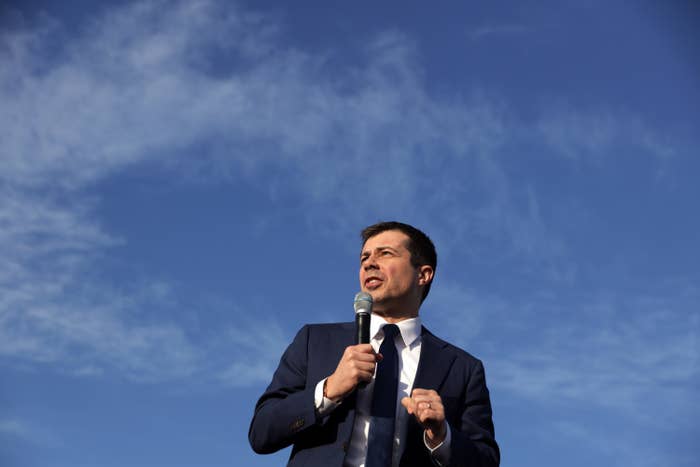
Pete Buttigieg has ended his presidential campaign, the former mayor told a crowd in his home city of South Bend, Indiana, on Sunday evening.
His narrow victory in Iowa marked the first time an openly gay candidate and a millennial won a presidential nominating contest in US history. Buttigieg, in a speech from South Bend, announced his decision first by recalling some of the values that guided his campaign.
“Today is a moment of truth,” Buttigieg said. “After a year of going everywhere, meeting everyone, defying every expectation, seeking every vote, the truth is that the path has narrowed to a close for our candidacy, if not for our cause. Another of those values is responsibility. And we have a responsibility to consider the effect of remaining in this race any further. Our goal has always been to help unify Americans to defeat Donald Trump and to win the era for our values. And so we must recognize that at this point in the race the best way to keep faith with those goals and ideals is to step aside and help bring our party and our country together."
Buttigieg's decision could help moderate Democrats consolidate their support around a single candidate as they look to keep Bernie Sanders, the independent democratic socialist, from winning the party's nomination. Buttigieg, who in recent weeks frequently criticized Sanders' policy proposals as too extreme, did not encourage his supporters to unite behind anyone else. But Virginia Rep. Don Beyer — the first member of Congress to endorse Buttigieg — quickly did, shifting his endorsement to former vice president Joe Biden just days before Virginia votes with other Super Tuesday states.
The Sunday announcement brings to an end Buttigieg's stunning rise from unknown mayor of Indiana's fourth-largest city to major presidential candidate.
“He surprised everyone through the whole campaign and continues to do the best thing for our party and our country,” Nan Whaley, the mayor of Dayton, Ohio, and one of the earliest supporters of Buttigieg’s campaign, said Sunday after word of the candidate's plans to drop out spread.
And his rise from relative anonymity to Iowa caucus winner echoed Jimmy Carter’s victory nearly 45 years ago — an outsider with the promise of understated, honest political restoration.
But Buttigieg couldn't turn his successes in Iowa and New Hampshire — close finishes with or behind Bernie Sanders — into the broad coalition needed to secure a Democratic nomination. His struggles in reaching black and Latino voters dominated coverage for months, and resulted in poor showings in Nevada and South Carolina as the primary moved into states with more diverse electorates.
Facing tough results for a second week in a row, Buttigieg told supporters late Saturday night, "I am determined to earn every vote on the road ahead."
But on Sunday, after meeting with Carter himself and attending events to commemorate the Civil Rights movement in Alabama, Buttigieg decided to end his campaign, cutting short a trip that would have taken him to Texas.
One adviser to the campaign, who requested anonymity to speak candidly, attributed Buttigieg’s downturn in recent weeks to delayed results in Iowa that “stole coverage” from what was Buttigieg’s most successful night as a candidate.
Buttigieg, ultimately, won the most delegates in the caucus state where the campaign heavily organized and the candidate spent months, balancing a national media-friendly strategy and the local presence. (Sanders won the first and second alignment in the state under the unusual rules that caucuses follow.) But those results came weeks after, and never — despite Buttigieg's caucus-night victory address — delivered the emphatic fundraising and media bounce the campaign had planned.
The adviser also noted the swell of media attention around Minnesota's Amy Klobuchar after her third-place finish in New Hampshire — behind Buttigieg — and around Michael Bloomberg, who didn’t compete in the first four states.
There was, the adviser argued, a “preoccupation with the media on everything besides actual results from Iowa and New Hampshire.”
Signs of money troubles began to show after New Hampshire, when sources told BuzzFeed News that dozens of field organizers were told their jobs were ending for budgetary reasons. In the days before Nevada, Buttigieg announced a $13 million fundraising goal he said he needed to hit by this week's Super Tuesday contests. The campaign, according to updates it had been issuing publicly, hadn't yet hit the mark by the time South Carolina results were announced Saturday.
Buttigieg had hoped to use Iowa and New Hampshire as a springboard to greater things, a strategy in part presaged by Barack Obama's 2008 campaign.
Buttigieg, in fact, modeled much of his approach on the Obama campaign, which galvanized millennial voters a decade ago. He spoke in the aspirational language about the day after Trump, projects the same kind of detached intellectualism, and centered his identity as the first gay candidate (and the perceived electoral risk that accompanies that identity) in how Barack Obama approached his own position as the party’s first black nominee and then the first black president.
It didn't work the same for Buttigieg after the first two states.
And despite also being the first millennial candidate to win a presidential nominating contest, Buttigieg's appeal resonated most with older Democrats, not peers and certainly not the next generation of voters, who prefer Sanders to all others. Buttigieg's actual political views remained somewhat opaque to the electorate — but over the course of the campaign, he shifted toward a considerably more moderate presentation and policy purview.
But his candidacy — especially in the muted response at times to its historical nature — marks off just how much has changed in the United States. When Obama ran for office in 2008, most Democrats and even he did not support marriage equality.

